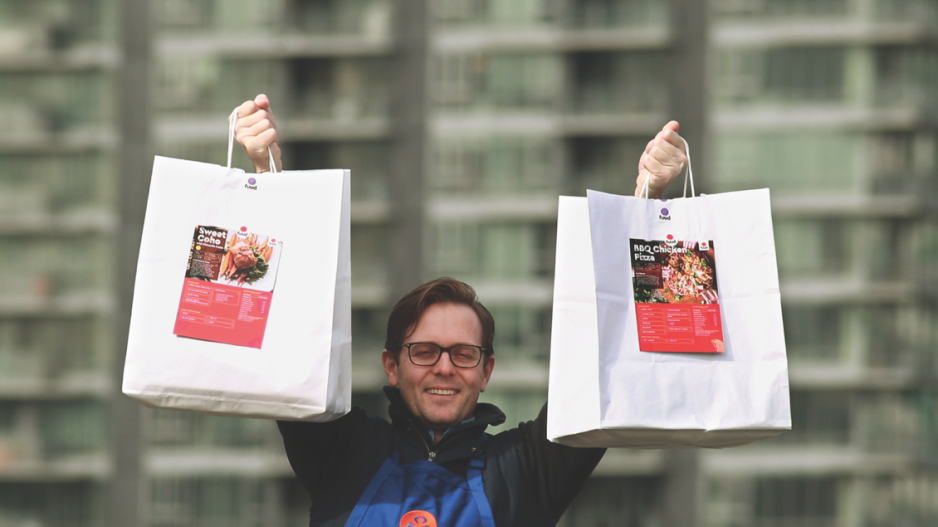The business of delivering meal kits for customers to mix together and cook at home is aiming to cut into grocery store sales.
Indeed, what had been a tiny but fast-growing niche within the booming food-delivery sector is increasingly becoming competitive, with new players launching operations, expanding territory serviced and seeking funding from investors.
That became clear on March 8, when an episode of the Canadian Broadcasting Corp. reality TV show Dragons’ Den showed B.C. meal-kit start-up Fuud.ca winning an agreement for a $90,000 loan at a 10% interest rate from Venture Communications CEO and “dragon” Arlene Dickinson.
If the company, which in its first four months generated $80,000 in gross sales, meets its ambitious growth target of $5 million in gross sales by the end of 2018, Dickinson’s loan would convert into a 35% equity stake in the company.
Fuud.ca CEO Thomas Buchan told Business in Vancouver that he expects a jump in business in part because of publicity generated by the TV appearance.
Any rise in business would be welcome for Buchan, given that his venture, which delivers about 2,000 meals per week, has heavy competition in Metro Vancouver and is likely to face more rivals in the months ahead.
Vancouverites can order meal kits from the multinational HelloFresh SE (FRA:HFG), which launched in Germany before expanding across Europe and to Canada, and Chefs Plate, which delivers more than 100,000 meals per week across Canada. HelloFresh does not reveal how many meals it ships weekly in Canada.
(Image: Unlike Fuud.ca, HelloFresh meals often come with pre-cut vegetables | HelloFresh)
Chefs Plate last fall snagged $10 million in capital from a variety of sources, including B.C. investor and Acton Capital Partners venture partner Hannes Blum, and it plans to use the money to automate its fulfilment centres in Toronto and Abbotsford.
Other competitors on the sidelines eyeing the B.C. market include the U.S. giant Blue Apron Holdings Inc. (NYSE:APRN), Montreal-based Goodfood Market Corp. (TSX:FOOD) and Montreal-based MissFresh, which is majority-owned by the grocer Metro Inc. (TSX:MRU).
Weight Watchers International Inc. (NYSE:WTW) rocked the sector (and sent Blue Apron shares down 17% in a day) earlier this month when it announced that it would launch meal kits. Walmart (NYSE:WMT), which plans to launch grocery delivery across Metro Vancouver this summer, also announced earlier this month that it has plans to create and sell its own meal kits.
Having large behemoths in the sector, however, does not worry Buchan.
“We’ve looked at the numbers and we know that essentially all the big players are losing their shirts trying to capture market share,” he said.
He explained that his company’s costs are competitive because he employs his own drivers, which allows him to keep costs down by using less extra packaging for fruits and vegetables.
HelloFresh’s Canadian CEO, Ian Brooks, confirmed to BIV that his company’s meals come with pre-cut carrots that require plastic wrap but he dismissed the extra cost of the packaging as minor.
Regardless, losses at large meal-kit sellers are racking up.
While Goodfood’s revenue soared in its most recent fiscal year to nearly $19.8 million, its net loss climbed more than eightfold to over $9.8 million in the year that ended on August 31, 2017.
Blue Apron’s loss widened to US$39.1 million in the year that ended December 31.
Another point of differentiation for Fuud.ca, which Buchan trumpets, is the company’s purchases from local farmers.
(Image: Fuud.ca meal kits come with most vegetables not pre-cut and with small bags of mixed spices | Glen Korstrom)
His competition, however, also buys from growers in the region. HelloFresh sources products from Delta’s Village Farms, while Chefs Plate has arrangements in the Fraser Valley with farmers near its Abbotsford warehouse, which employs about 150 workers.
“We invested in Chefs Plate because of its long-term strategy on making proper investments to scale the business in tandem with demand,” said Blum, who founded AbeBooks on Vancouver Island before selling the venture to Amazon.com Inc. (Nasdaq:AMZN) in 2008.
“We like the fact that Chefs Plate is creating a strong value proposition…. This strategic approach results in high customer retention and reduces the need for continuous discounting to retain customers.” •




